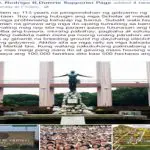Nine of 14 Supreme Court justices voted in favor of a Marcos burial at the Libingan ng mga Bayani (LNMB), practically making him a hero. Are the SC justices aware of what this would do to the history of the country and its values system? The present SC will be held accountable by posterity once this event is put in the right light and future generations ask who should answer for it. In a gist, this is what Atty. Mel Sta. Maria said in his recent article published on InterAksyon.
Atty. Mel Sta. Maria is a legal expert in a radio program on DWFM and in Aksyon TV (among other aired programs) and both have nationwide reach. He is dean of the Institute of Law at the Far Eastern University and a professor at the Ateneo Law School.
The following is a summary with short excerpts of the Opinion article he wrote published on the InterAksyon website on November 11.
“If one thinks that the Marcos-Libingan ng mga Bayani (LNMB) decision is wrong, then he/she must not be inhibited/prevented from expressing that it is wrong,” Sta. Maria began, encouraging dissenters and critics to voice out their opinions.
He said SC decisions, though final, are not perfect, being made by fallible humans like us. People should therefore be vigilant and examine for themselves what these decisions are. If they deem them wrong, they should say so in an atmosphere of freedom, even repeatedly perhaps, “to the point of annoyance and of saying that the decision ignores the foundation upon which the Constitution was built.”
“As citizens, we will accept decisions as a legal development (whether negative or positive),” Sta. Maria continued. But just the same, he said that dissenters and those negatively affected by such promulgated-ruling should not be barred from expressing their opinions, though these matters have been decided by the highest court of the land with finality.
[ads1]
There must be a way for the ordinary citizen to make his thoughts or grievances directly known to the SC, especially if he is adversely affected by its decision and most especially if he is a taxpayer.
Sta. Maria explained: “Supreme Court Justices are high public officials with no direct mandate from the sovereign people. They are not elected and yet they have the most secure tenure with high-paying salaries and very generous pensions funded by taxpayers’ money. They are granted great power to determine important cases ranging from individual private concerns to interest involving the whole nation and our democratic way of life. So (many) privileges are given to these magistrates and yet no direct means are given to the people to immediately put them to task on decisions which, at least perceivably, are horrendous.”
The idea that justices and the judiciary should be untouchables and safe from criticism is old-school, Sta. Maria said. So he quoted a modern thinker from the US Supreme Court, former Associate Justice Brewer:
“It is a mistake to suppose that the Supreme Court is either honored or helped by being spoken of as beyond criticism. On the contrary, the life and character of its justices should be the objects of constant watchfulness by all, and its judgments subject to the freest criticism. The time is past in the history of the world when any living man or body of men can be set on a pedestal and decorated with a halo.”
Granted that some critics really have nothing worthy to say, nonetheless even criticism like that is better than zero criticism, said Brewer.
Brewer analogized, as quoted by Sta. Maria: “The moving waters are full of life and health; only in the still waters is stagnation and death.” (Government by Injunction, 15 Nat’l Corp. Rep. 848,849
To Sta. Maria, then, the SC decision does not conclude everything. The pro-Marcos burial should not rejoice yet in their triumph. In fact, to Sta. Maria, we should all wait for the second part of the story.
“(The second part) is the holding of the Supreme Court, its members or at least nine (9) of them, accountable for their decision – even if only via public opinion. We must not forget that justices are men and women who are fallible just like all of us. They too can commit mistakes – and because of their highly sensitive positions – mistakes that are far-reaching, damaging, disgusting, and embarrassing,” Sta. Maria reminded us all.
Moreover, Sta. Maria explained: “Most of all, these magistrates are still public servants. The Constitution provides that they ‘must, at all times, be accountable to the people, serve them with utmost responsibility, integrity, loyalty, and efficiency; act with patriotism and justice, and lead modest lives.’”
In prioritizing to serve the people “with utmost responsibility,” was their decision to grant a Marcos burial at LNMB in line with that mandate?
[ads2]
“Did this Marcos-LNMB-decision do justice to the thousands of human rights victims of the regime of the dictator Ferdinand Marcos? Was the decision, though, in fact, presenting an issue of whether or not the President acted with grave abuse of discretion, in effect, a case of determining whether or not to honor the memory of the ruthless dictator in a most sacred place reserved for heroes?” Sta. Maria asked.
He answered his question. “There is no doubt in my mind and, I am sure, in many others that it is the latter. And if it were indeed so, was it an act of patriotism to allow that burial? Did the decision affirm and enhance the quality of national pride uplifting us all?”
However, Sta. Maria feared the worst when he asked: “Or did it usher in a disgraceful revival of impunity?”
Click on the button to continue reading.
[ads3]


